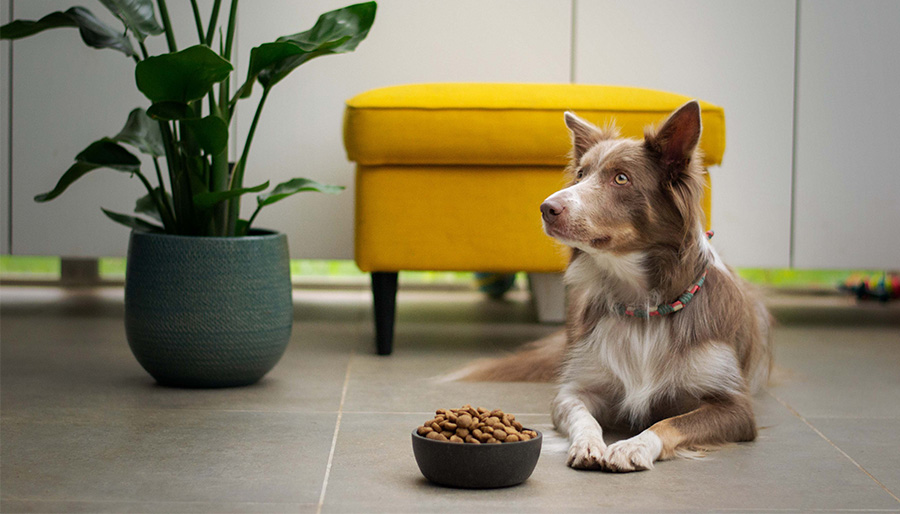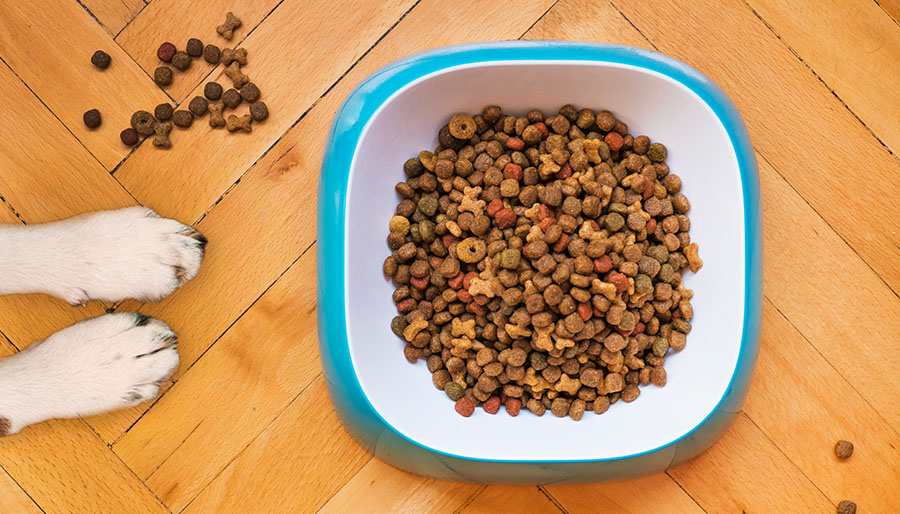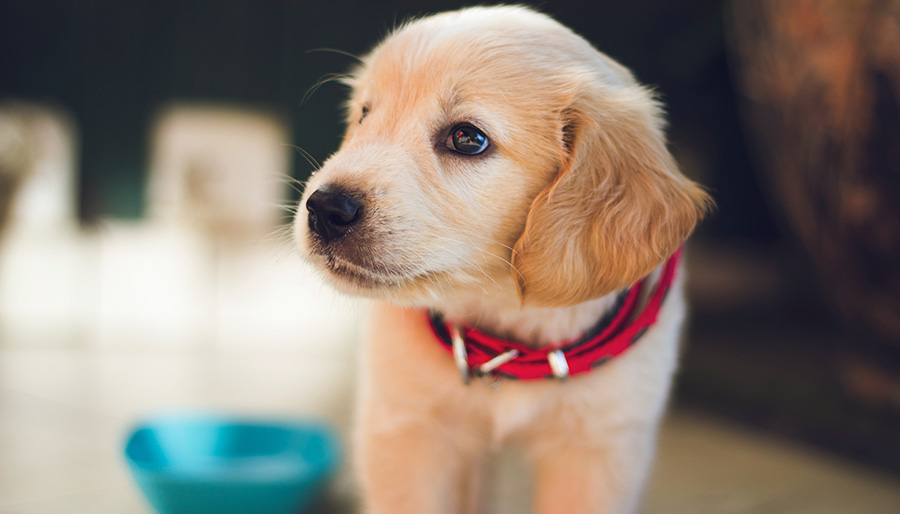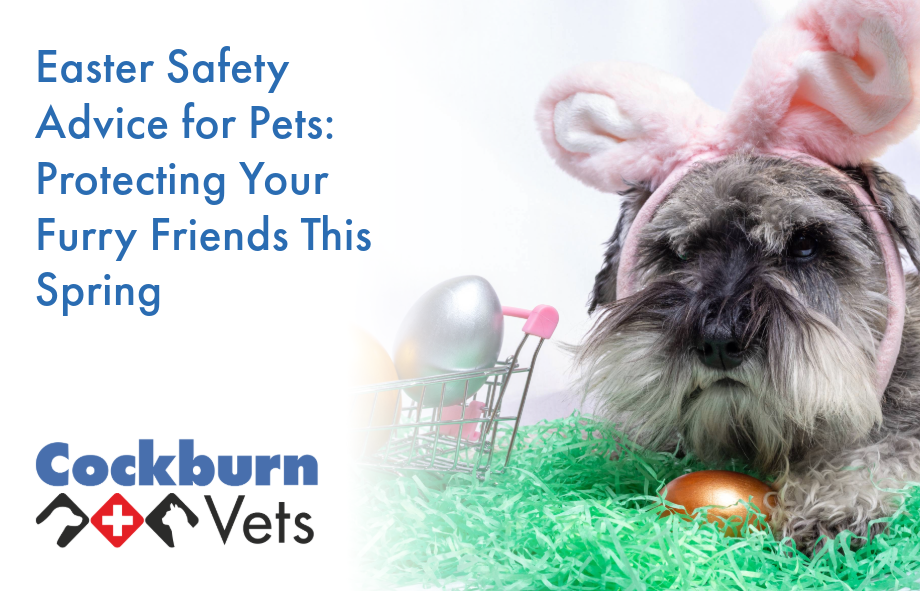A good diet is key to a long and healthy life. Both nutritional content and portion control have a big impact on doggy health, and it’s much better to get this right for your dog from the beginning of their life with you.
It’s essential to make sure your dog is well nourished as this can prevent a lot of health issues, but weight is also very important. As many of us know, losing excess weight is no fun! And it’s the same for dogs. Keeping an eye on condition and making tweaks here and there by balancing food intake with exercise is a much better way to maintain ideal weight.
To help with this, remember Healthy Paws Club members get UNLIMITED consultations with our nurses throughout the year where we can check their shape and weight and discuss any other concerns. Don’t forget you also receive a plus advise and guidance on diet (Not already a member? Click here for more details)
Getting it right from the start

When you bring a new puppy home, you should continue feeding them the food they had been eating in their old home. If this food isn’t ideal and you want to change, you can start to switch it over but make sure this transition is gradual or you’ll risk upsetting their stomachs. Change over slowly by mixing the two foods together for 5-7 days.
There are a few diet choices around for puppies including wet, moist and dry foods. It’s up to you which you choose, but don’t offer variety as they might become picky eaters, and it can cause stomach upsets.
Puppies grow 20 times faster than adult dogs and so require a special diet to aid their physical development. A specially formulated growth food is recommended which needs to be fed at evenly spaced intervals to avoid over stretching their small stomach:
- Up to four months old Four meals a day. You can feed to appetite as their growth and development is rapid, so give them as much in each meal as they want to eat then take it away if any is left uneaten. If food is left down all the time they might starting less at one time and grazing instead, which isn’t how they’re naturally programmed to eat, and can cause digestive problems.
- Four to five months old Three meals a day, still feeding to appetite.
- Five months onwards Two meals a day but portion controlled as growth has now slowed, and they will start putting on excess weight if allowed to eat as much as they like. It’s sometimes tricky to work out how much to feed them as they will still be growing and therefore their weight increasing, so a good measure is to monitor their condition by feel. You should always be able to feel their ribs and their spine – if you can’t, they’re becoming overweight and you should feed them less.
- One year Either two smaller meals a day or one bigger meal.
Which food is best? Dry, moist or wet?
Dry complete foods

Complete means that these biscuits theoretically contain all the nutrients a dog needs and can be the easiest choice to ensure your dog is getting all the nutrients they need to grow and thrive, but quality varies. Cheap brands are often the nutritional equivalent of a McDonalds diet and aren’t going to keep your dog in the best of health.
To ensure your dog gets what they need, choose a food designed for their life stage, size and condition and buy the best quality food you can afford. You often need less good-quality food than the cheaper varieties, so buying cheap is often a false economy anyway.
Some puppies aren’t used to eating dry foods, so if you choose biscuits but your puppy is resisting, make it more palatable to begin with by soaking it in a little water to soften it and bring out the flavours, or mixing it with a little tinned food. You can gradually reduce this until they’re fully weaned and used to the biscuits.
We offer a great range in the practice and Healthy Paws Club members get exclusive money-back deals on Hills life-stage diets purchased at the surgery.
Semi-moist and tinned foods
Again there are lots of choices when it comes to tinned food, and these also vary in quality.
Choose a specialist food that’s nutritionally complete, and the best you can afford. We aren’t trying to bankrupt you when we say this! It will end up saving you money in the long term as your pet will be much stronger and healthier for it.
Home-made food

We don’t advise home cooked diets, as whilst the intentions are always good it’s really difficult to make sure they have the right nutritional content.
Puppies need the best diet possible as they grow, and even a slight imbalance can harm their development and mean they don’t put down the strongest cornerstones for their adult lives.
Treats
There are a wide variety of prepared and natural treats on the market which vary hugely in quality. Some commercial treats have lots of sugar, colourings, milk products and fat in them. Even ‘doggy chocs’ or ‘low fat yoghurt drops’ can contain sugars or lactose (milk sugar) so always check the ingredients label.
Good quality prepared treats have been developed with dogs dietary needs in mind. However, all treats should be given sparingly, never more than 15% of the total calorie intake.
If used regularly reduce the amount of main meal food your dog is receiving in order to avoid obesity. Some chew treats have proven ability to help prevent dental diseases, but again check the label to ensure you are getting a genuine product.
Real chocolate is poisonous to dogs and can cause liver damage and even be fatal, so never give your dog any chocolate, or leave any lying around for it to find and eat, especially at Christmas time.
Avoid giving your dog any sweet biscuits or sugary treats which are bad for its teeth as well as its waistline, and can cause sugar ‘highs’ and ‘lows’. Stick to prepared treats and desiccated liver tablets.


